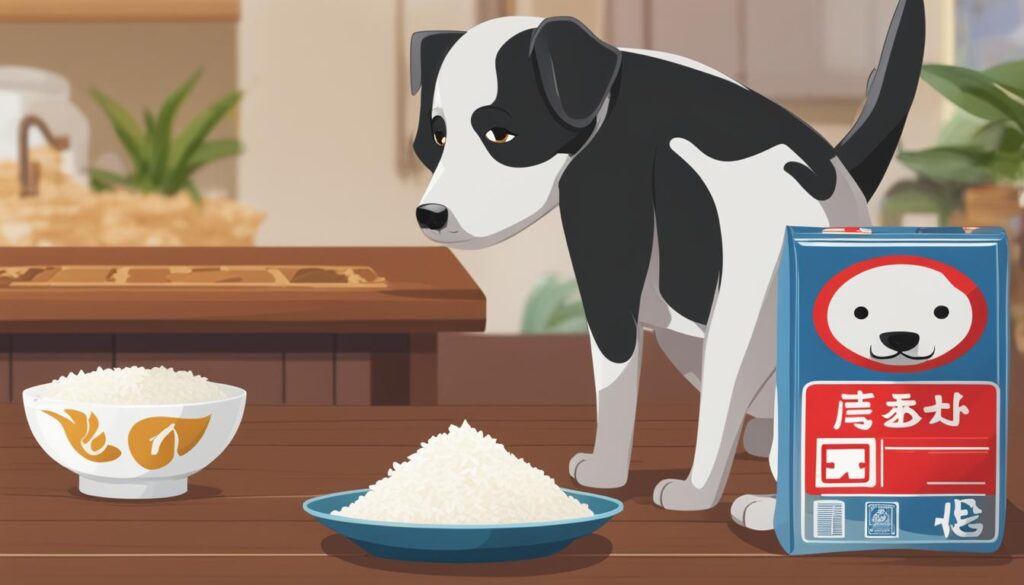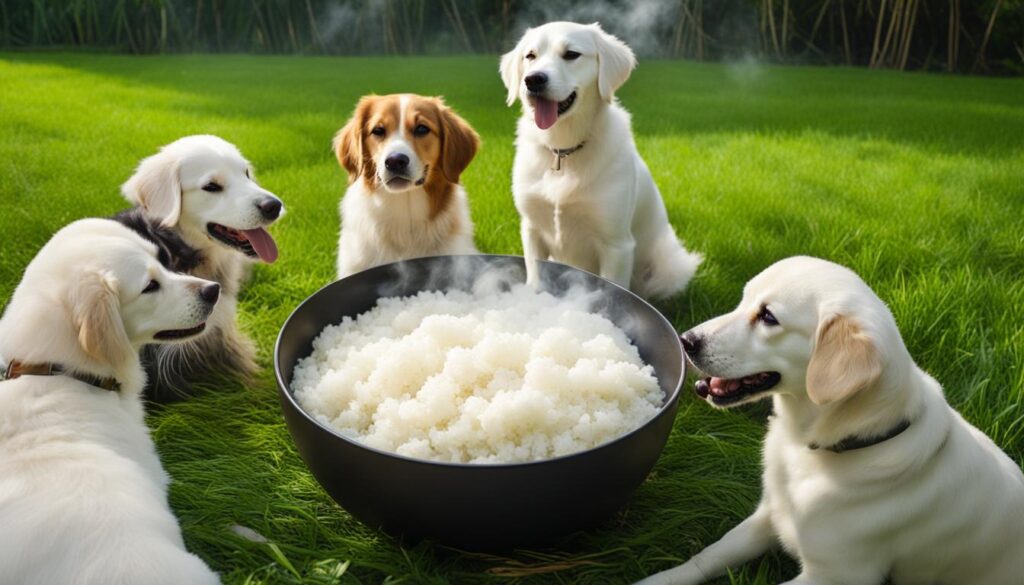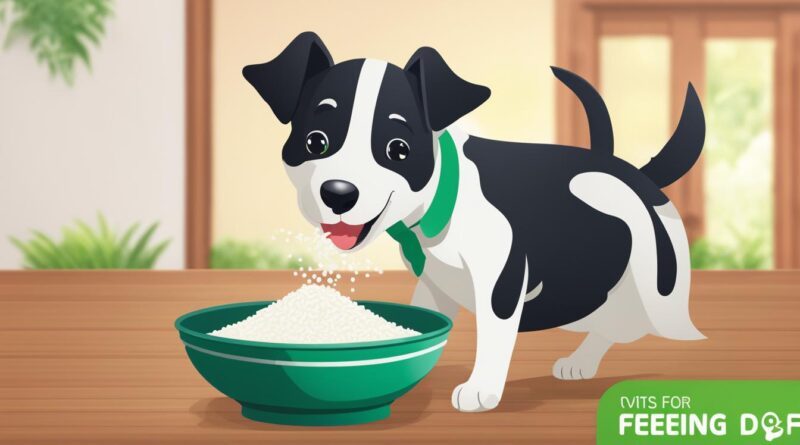Can Dogs Safely Eat Jasmine Rice?
If you’re a dog owner, you’ve probably wondered about the safety of feeding certain foods to your furry friend. One common question that often arises is whether dogs can eat jasmine rice. Jasmine rice is a type of aromatic long-grain rice known for its fragrance and delicate flavor. But is it safe for dogs? Let’s find out.
Key Takeaways:
- Jasmine rice is safe for dogs to eat.
- It can provide some health benefits due to its nutrient content.
- Consult with a veterinarian before introducing jasmine rice or any new food into your dog’s diet.
- Feed jasmine rice in moderation and be aware of potential allergies or sensitivities.
- Other types of rice, such as white rice, brown rice, basmati rice, and wild rice, can also be fed to dogs.
The Benefits of Jasmine Rice for Dogs
Jasmine rice offers numerous health benefits for dogs, making it a valuable addition to their diet. This aromatic rice variety contains essential vitamins and minerals that promote canine nutrition and overall well-being.
Jasmine rice is rich in:
- Magnesium: Supports muscle function and bone health.
- Phosphorus: Essential for strong teeth and bones.
- Manganese: Contributes to the metabolism of proteins and carbohydrates.
- Selenium: Acts as an antioxidant to protect the body’s cells.
- Iron: Helps transport oxygen throughout the body.
- Vitamin B: Important for energy production and nervous system function.
- Folic Acid: Supports cell growth and division.
- Thiamin and Niacin: Essential for metabolic processes and overall health.
These nutrients contribute to the overall health and vitality of dogs, promoting healthy organ function, strong bones and muscles, and a robust immune system. Incorporating jasmine rice into your dog’s diet can be a beneficial way to provide them with these essential nutrients.
Image related to the Benefits of Jasmine Rice for Dogs:
*Image for illustrative purposes only. Not all dogs may resemble the image shown.
Jasmine Rice for Dogs with Digestive Issues
If your dog is experiencing gastrointestinal issues, such as diarrhea, incorporating jasmine rice into their diet can be beneficial. Jasmine rice is often recommended by veterinarians as a bland, easily digestible food that can help soothe their upset stomach.
When dogs have digestive issues, it’s important to provide them with a gentle and easily digestible diet. Jasmine rice fits the bill perfectly due to its soft texture and low fiber content. This makes it easier for your dog’s digestive system to break down and absorb nutrients.
Jasmine rice is also beneficial because it is non-allergenic, meaning it is less likely to cause allergic reactions in dogs compared to other grains. This is especially important when your dog’s digestive system is already sensitive and compromised.
When feeding jasmine rice to your dog, make sure it is fully cooked and plain, without any additional ingredients like salt or butter. It’s always best to consult with your veterinarian for specific feeding guidelines tailored to your dog’s needs. They will be able to recommend appropriate portion sizes and any additional dietary modifications that may be necessary.
Remember, while jasmine rice can be beneficial for dogs with digestive issues, it should only be introduced as part of a balanced and varied diet. It should not replace their regular dog food, but rather be used as a temporary solution to help alleviate their gastrointestinal discomfort.
“Feeding jasmine rice to dogs with digestive issues can provide them with a gentle and easily digestible food that can help soothe their upset stomach.”
Benefits of Jasmine Rice for Dogs with Digestive Issues
| Benefits | Description |
|---|---|
| Easy Digestion | Jasmine rice is soft and low in fiber, making it easier for dogs to digest and absorb nutrients. |
| Non-Allergenic | Jasmine rice is less likely to cause allergic reactions in dogs compared to other grains, making it suitable for dogs with sensitive digestive systems. |
| Temporary Solution | Jasmine rice should be used as a temporary solution to alleviate gastrointestinal discomfort and not replace a balanced and varied diet. |

Feeding jasmine rice to dogs with digestive issues can help bring them relief and provide them with necessary nutrients to support their overall well-being. Always remember to consult with your veterinarian for specific feeding recommendations tailored to your dog’s individual needs.
Risks of Feeding Jasmine Rice to Dogs
While jasmine rice is generally safe for dogs, it’s important to be aware of the potential risks associated with feeding it to your furry friend. As with any new food introduced into a dog’s diet, moderation is key.
Jasmine rice has a high glycemic index, which means it can significantly raise blood sugar levels. This can be a concern for dogs with diabetes or obesity, as it may worsen their condition. Therefore, it’s crucial to consult with your veterinarian before incorporating jasmine rice into the diet of a dog with these health issues.
Additionally, some dogs may have allergies or sensitivities to rice, including jasmine rice. It’s important to monitor your dog for any adverse reactions, such as gastrointestinal upset, skin irritations, or changes in behavior, after consuming jasmine rice. If you notice any of these symptoms, it’s best to discontinue feeding jasmine rice and consult with your veterinarian for further guidance.
“Feeding jasmine rice in moderation helps mitigate the risks and allows you to monitor your dog’s response.”
Alternatives to Jasmine Rice for Dogs
If you’re looking for alternatives to jasmine rice for your furry companion, there are several options to consider. These alternatives can provide similar nutritional benefits without the potential risks associated with jasmine rice.
| Alternative | Nutritional Benefits |
|---|---|
| Brown Rice | Brown rice is a whole grain rich in fiber, which can aid in digestion and promote bowel regularity. It also provides essential minerals such as manganese and selenium. |
| Quinoa | Quinoa is a complete protein source that contains all nine essential amino acids. It’s also rich in fiber, magnesium, and phosphorus. |
| Sweet Potato | Sweet potatoes are a great source of dietary fiber, vitamins A and C, and antioxidants. They can provide a healthy carbohydrate option for dogs. |
These alternatives can be prepared and served to dogs in a similar manner as jasmine rice. However, it’s always recommended to consult with your veterinarian to ensure they are suitable for your dog’s specific dietary needs.

Other Types of Rice Dogs Can Eat
Dogs can enjoy a variety of rice options in addition to jasmine rice. By incorporating different types of rice into their diet, you can provide them with a range of nutritional benefits. Here are a few rice varieties that dogs can safely consume:
- White Rice: Dogs can eat white rice as it is easy to digest and gentle on the stomach. It can be an excellent option to help soothe digestive issues or serve as a bland meal for dogs with upset stomachs.
- Brown Rice: Brown rice is a rich source of fiber, which aids in digestion and promotes bowel regularity for dogs. It also contains essential vitamins and minerals that contribute to overall canine nutrition.
- Basmati Rice: Basmati rice is a type of long-grain rice with a fragrant aroma. Dogs can safely consume basmati rice, enjoying its unique flavor while reaping the nutritional benefits it offers.
- Wild Rice: Wild rice is not actually rice but rather a type of grass seed. It is packed with nutrients, including essential amino acids, and can provide a healthy addition to your dog’s diet.
Each type of rice mentioned above has its own nutritional profile and potential benefits for dogs. It’s crucial to consider your dog’s specific dietary needs and consult with a veterinarian before incorporating any new variety of rice into their meals.

Preparing and Serving Jasmine Rice to Dogs
When it comes to feeding your dog jasmine rice, it’s important to take certain precautions to ensure their safety and well-being. Follow these guidelines to prepare and serve jasmine rice to your furry friend:
Cooking the Rice
Start by fully cooking the jasmine rice until it is soft and easily digestible for your dog. Avoid adding any seasonings, additives, or spices such as salt or butter. Keep it plain and simple to prevent any potential digestive issues.
Addition of Protein
To enhance the flavor and nutritional value of the rice, consider adding a small amount of boiled boneless, skinless chicken or turkey. This will not only provide added nutrients but also make the rice more appealing to your dog. Ensure that the protein is cooked thoroughly and free from any bones or skin that may be harmful to your pet.
Serving Size and Moderation
Rice should be served to your dog in moderation as a treat or as part of a balanced meal. The serving size will vary based on the size and nutritional needs of your dog. It’s best to consult with your veterinarian to determine the appropriate portion size for your furry companion. Overfeeding your dog rice can lead to weight gain and potential health issues.
Monitoring Your Dog’s Reaction
After introducing jasmine rice into your dog’s diet, it’s important to observe their reaction and overall health. If you notice any signs of allergies or sensitivities such as vomiting, itchiness, inflamed paws, dry skin, rashes, or hair loss, discontinue feeding rice to your dog and consult with your veterinarian.
Image
| Preparation and Serving Tips |
|---|
| Fully cook the jasmine rice |
| Avoid adding salt, butter, or other seasonings |
| Add a small amount of boiled boneless, skinless chicken or turkey for flavor and nutrients |
| Serve rice in moderation as a treat or balanced meal |
| Monitor your dog for any adverse reactions or allergies |
Potential Allergies and Reactions
While rare, some dogs may have allergies or sensitivities to rice. It’s essential to be aware of the signs of an allergic reaction in case your dog is allergic to rice.
“Can my dog be allergic to rice?”
If you’re wondering whether your dog can be allergic to rice, the answer is yes. Although it’s not very common, some dogs can develop an allergic reaction to rice.
If your dog is allergic to rice, they may exhibit various symptoms, including:
- Vomiting
- Itchy skin
- Inflamed paws
- Dry skin
- Skin rash
- Hair loss
If you notice any of these symptoms after your dog consumes rice, it’s important to discontinue feeding them rice and consult with a veterinarian. Allergies can vary in severity, and a professional can provide guidance on managing your dog’s condition.
In the next section, we will explore other types of rice that dogs can eat, providing you with a variety of options for your furry friend’s diet.
Conclusion
In conclusion, jasmine rice can be a safe and nutritious addition to your dog’s diet. It contains essential vitamins and minerals that can contribute to their overall health and well-being. However, it’s important to feed jasmine rice to your dog in moderation and tailor it to their specific needs.
Consulting with a veterinarian is crucial before introducing any new food into your dog’s diet, including jasmine rice. They can provide personalized advice and guidance based on your dog’s individual needs and health conditions. They will help you determine the appropriate portion sizes and frequency of feeding jasmine rice.
Remember, while jasmine rice is generally safe for dogs, some dogs may have allergies or sensitivities to rice. If you notice any adverse reactions, such as vomiting, itchy skin, or digestive issues, discontinue feeding jasmine rice and seek veterinary consultation.
Overall, including jasmine rice in your dog’s diet can be a beneficial choice, but it’s essential to prioritize their health and consult with a veterinarian to ensure their safety and well-being.
FAQ
Can dogs safely eat jasmine rice?
Yes, dogs can safely eat jasmine rice. It is non-toxic and can provide some health benefits. However, it’s important to consult with a veterinarian before introducing any new food into your dog’s diet to ensure it is appropriate for their specific needs.
What are the benefits of jasmine rice for dogs?
Jasmine rice contains important vitamins and minerals including magnesium, phosphorus, manganese, selenium, iron, vitamin B, folic acid, thiamin, and niacin. These nutrients can contribute to a dog’s overall health and well-being.
Is jasmine rice recommended for dogs with digestive issues?
Yes, jasmine rice is often recommended by veterinarians as a bland food that is easy to digest and can help soothe the stomach. It is beneficial for dogs with gastrointestinal issues such as diarrhea.
Are there any risks associated with feeding jasmine rice to dogs?
While jasmine rice is generally safe for dogs, it should be fed in moderation. It has a high glycemic index, which can raise blood sugar levels and be a concern for dogs with diabetes or obesity. Additionally, some dogs may have allergies or sensitivities to rice.
What are some alternatives to jasmine rice for dogs?
Dogs can also safely consume other types of rice including white rice, brown rice, basmati rice, and wild rice. Each type of rice has its own nutritional profile and potential benefits for dogs, but it’s important to consult with a veterinarian before incorporating any new variety of rice into their diet.
How should jasmine rice be prepared and served to dogs?
Jasmine rice should be fully cooked and served plain, without any additives like salt or butter. It can be beneficial to add a small amount of boiled boneless, skinless chicken or turkey to the rice for added flavor and nutrients. Rice should be served in moderation as a treat, with portion sizes varying based on the size of the dog.
Can dogs be allergic to rice?
While rare, some dogs may have allergies or sensitivities to rice. Signs of an allergic reaction can include vomiting, itchy skin, inflamed paws, dry skin, skin rash, and hair loss. If your dog shows any of these symptoms after consuming rice, it’s best to discontinue feeding it and consult with a veterinarian.


